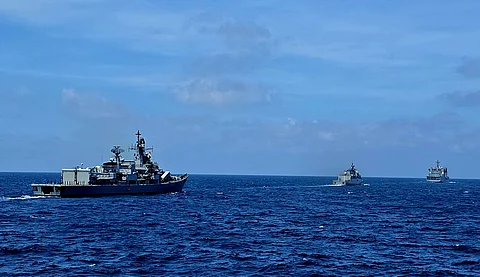
- NEWS
- the EDIT
- COMMENTARY
- BUSINESS
- LIFE
- SHOW
- ACTION
- GLOBAL GOALS
- SNAPS
- DYARYO TIRADA
- MORE

The Philippines’ enhanced maritime presence and strengthened by the joint maritime drills with the country’s allied partners in the West Philippine Sea (WPS) have contributed to a marked “decline in coercive and aggressive behavior” by Chinese maritime forces, a military official said Tuesday.
In a press conference at the Camp Aguinaldo, Quezon City, Armed Forces of the Philippines (AFP) spokesperson for WPS, Rear Admiral Roy Vincent Trinidad, stressed a sustained increase in patrols, joint maritime activities, and a more assertive presence on key outposts joint naval drills with key allies, has helped reinforce the country’s sovereign claims and deter unlawful incursions in the disputed WPS.
Trinidad said the country’s existing Maritime Cooperative Activities (MCAs) and Multilateral Maritime Cooperative Activities (MMCs) in the WPS are already yielding tangible effects, particularly in taming Chinese behavior in the contested maritime region.
“First and foremost, it is not an aspiration. It's already a reality…So we have noticed, I mentioned earlier, that for every MCA, there is a change in their [China] actions,” Trinidad stressed.
“There are no coercive and aggressive actions being conducted by the coast guard, Chinese coast guard, and the PLA [People Liberation Army] Navy against our ships from the coast guard, BFAR [Bureau of Fisheries and Aquatic Resources], Nav,y and our aircraft,” he added.
Trinidad stressed that the Philippines' enhanced presence in the West Philippine Sea, bolstered by MCAs and defense diplomacy, has led to a noticeable decline in coercive and aggressive actions from Chinese maritime forces.
Asked about the future of these initiatives beyond the term of President Ferdinand Marcos Jr., Trinidad was cautious not to speculate.
“I could only speak on what we have done so far for this year under the current administration and what we intend to do without going into details for the remaining part of the year,” he said.
Defense diplomacy
Trinidad stressed that the current direction of the Department of Defense (DND), guided by defense diplomacy and the MMCAs, has significantly strengthened the Philippines' strategic partnerships with key allies through joint military activities, enhanced defense relations, and multilateral cooperation under the present administration.
“The MCA's, the direction of the Department of Defense is defense diplomacy, and the results are there. We now have five strategic partnerships with other countries, five countries. We have elevated our defense relationship,” he said. “ This I can say is the direction of the AFP under the current administration.”
Trinidad then underlined the importance of public understanding and support, stressing that a unified national perspective on the WPS is key to sustaining current gains.
“What we are doing right now is to ensure that every Filipino understands this is an existential threat. It will impact into the future of the Philippines and the next generation of Filipinos,” he emphasized.
Trinidad also revealed that the Philippines’ policy of “defense diplomacy” is yielding significant international backing.
The AFP has so far secured five strategic partnerships and has elevated defense cooperation with countries such as Japan, India, Australia, New Zealand, South Korea, Vietnam, Canada, the UK, France, and Italy.
Trinidad said these countries are not only giving statements of support but are backing up the Philippines with actions by sending ships, troops, and aircraft to do joint activities with the AFP.
As of present, the AFP has conducted a total of 12 MCAs and 9 MMCAs with allied countries since November 2023.
Meanwhile, the AFP reported that no PLA Navy or China Coast Guard vessels have been observed in the ongoing MCA between the AFP and the Australian Defence Force (ADF) near Southwest Lubang Island, Mindoro, on August 19.
